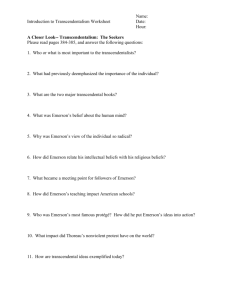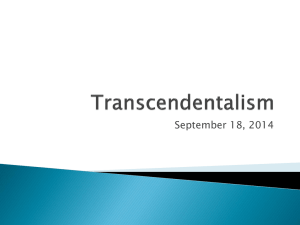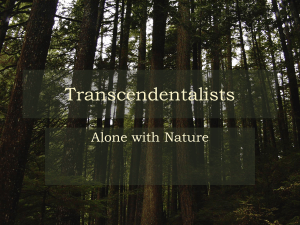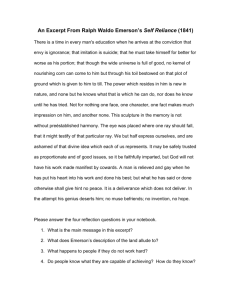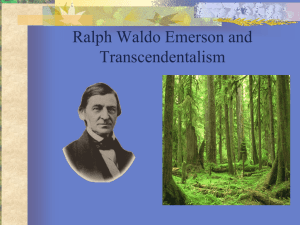Nature - mssiciliano
advertisement
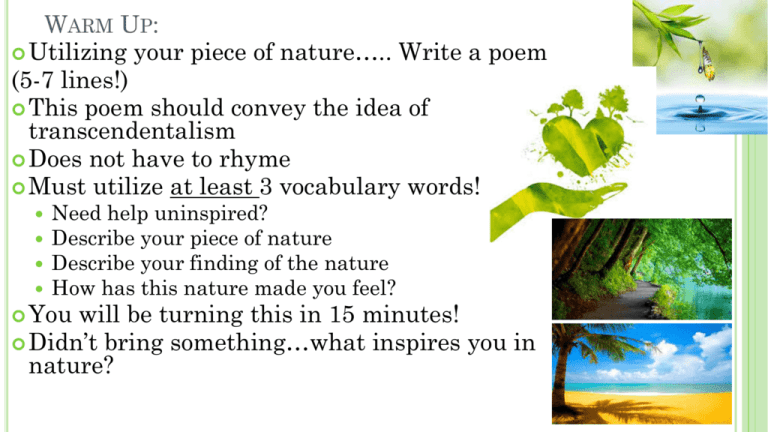
WARM UP: Utilizing your piece of nature….. Write a poem (5-7 lines!) This poem should convey the idea of transcendentalism Does not have to rhyme Must utilize at least 3 vocabulary words! Need help uninspired? Describe your piece of nature Describe your finding of the nature How has this nature made you feel? You will be turning this in 15 minutes! Didn’t bring something…what inspires you in nature? TRANSCENDENTALISM REMINDERS Core beliefs: self-reliance, purity of the imagination, and inspirational purity of nature People are born good and pure. Society and its institutions (political orgs and organized religion) will lead to corruption of the individual We can figure out good/bad when we use intuition. Strong community comes from strong sense of self. Figuring out how to feel about life and using intuition was more important than logical, scientific approach to life. Nature is immune to corruption of society. Studying and worshipping it (maybe even living in it-Thoreau) can teach what it means to be human. “The Apology” by Emerson Think me not unkind and rude, That I walk alone in grove and glen*; I go to the god of the wood To fetch his word to men. 5 10 15 20 Tax* not my sloth* that I Fold my arms beside the brook; Each cloud that floated in the sky Writes a letter in my book. Chide* me not, laborious band*, For the idle flowers I brought; Every aster* in my hand Goes home loaded with a thought. There was never mystery, But 'tis figured* in the flowers, Was never secret history, But birds tell it in the bowers*. 1. 2. 3. One harvest from thy field 4. Homeward brought the oxen strong; 5. A second crop thine acres yield, Which I gather in a song. grove and glen (2): the woods and fields Tax (5): make demands or here (more accurately) to criticize sloth (5): it’s either a very slow marsupial looking ape thing or it means to be idle and lazy chide (9): scold or rebuke laborious band (9): group of people who are industrious as opposed to the speaker who clearly is doin’ nothing. aster (11): man, that ain’t nothing but a fancy kind of daisy figured (14): as in figured out, understood bowers (16): pleasant shady area under a tree What does the speaker demand from his audience in the opening stanza? Line 4 suggests that the speaker will . . . Stanzas 2 and 3 suggest that the speaker is lazy. Why is this not a bad thing? What “secret history” is revealed by birds (15)? The use of “song” in the final line. Denotative or connotative? RALPH WALDO EMERSON Father of Transcendentalism “Trust Thyself” Wrote: Nature Self-Reliance NATURE BACKGROUND: EMERSON AND “NATURE” Emerson was a minister Leaves position after questioning faith and loss of first wife Suffers many personal losses after this Publishes “Nature” in 1836 Culmination of ten years of study, theorizing, and reflection Represented new philosophy Way to help readers understand the world around them and instructs them on how to use nature to find the answers to the mysteries of the world. Intro and eight subsequent chapters- each with its own focus NATURE In the presence of nature, Emerson feels exhilarated, restored, and part of God We delight in nature. We find something in nature as beautiful as our own spiritual nature. Even though we’re all connected, we shouldn't rely on each other. ANNOTATION OF NATURE Nature is a setting that fits equally well a comic or a mourning piece. In good health, the air is a cordial of incredible virtue. Crossing a bare common, in snow puddles, at twilight, under a clouded sky, without having in my thoughts any occurrence of special good fortune, I have enjoyed a perfect exhilaration. I am glad to the brink of fear. In the woods too, a man casts off his years, as the snake his slough, and at what period so ever of life, is always a child. In the woods, is perpetual youth. Within these plantations of God, a decorum and sanctity reign, a perennial festival is dressed, and the guest sees not how he should tire of them in a thousand years. NATURE In the woods, we return to reason and faith. There I feel that nothing can befall me in life, — no disgrace, no calamity, (leaving me my eyes,) which nature cannot repair. Standing on the bare ground, — my head bathed by the blithe (carefree) air, and uplifted into infinite space, — all mean egotism vanishes. NATURE It is necessary to use these pleasures with great temperance. For, nature is not always tricked in holiday attire, but the same scene which yesterday breathed perfume and glittered as for the frolic of the nymphs, is overspread with melancholy ( def: gloomy, moody) today. Nature always wears the colors of the spirit. To a man laboring under calamity (great misfortune), the heat of his own fire hath sadness in it. Then, there is a kind of contempt of the landscape felt by him who has just lost by death a dear friend. The sky is less grand as it shuts down over less worth in the population. EMERSON’S NATURE: COMPLETE GUIDED ANNOTATIONS READING AND ?’S 1. 2. 3. 4. Why did he write this? What’s his point? How do man and nature relate to each other? What does Emerson mean when he says he becomes "a transparent eye-ball" (442)? In what way does nature serve as a teacher? CLOSURE Emerson is considered the father of transcendentalism, what about his nature essay do you think made people buy into this movement? http://www.youtube.com/watch?v=m5k9x16yYGo SELF RELIANCE NATURE REVIEW: What What was the point of this essay? was he trying to say about nature and human relationships? SELF RELIANCE INTRODUCTION: “There is a time in every man's education when he arrives at the conviction that envy is ignorance; that imitation is suicide; that he must take himself for better, for worse, as his portion; that though the wide universe is full of good, no kernel of nourishing corn can come to him but through his toil bestowed on that plot of ground which is given to him to till.” “Trust thyself: every heart vibrates to that iron string.” SELF RELIANCE COMPLETE THE GUIDED ANNOTATIONS Why does Emerson see society as the enemy of individuality? What is the role of nonconformity? What did that word mean to Emerson? How is trust a part of being self-reliant? NATURE AND SELF RELIANCE With a partner, take the annotated guides from both essays to create: A 5 pane comic strip (at least 1 character) 5 pieces of textual evidence to support your idea (1 per pane) A character who embodies what Emerson was trying to instruct people to do with both his essays! CLOSURE: What tenants of transcendentalism does this exemplify? “Dead Poets Society” http://www.youtube.com/watch?v=SnAyr0kWRGE
